Home » Posts tagged 'saudi arabia' (Page 6)
Tag Archives: saudi arabia
The Attacks on Abqaiq and Peak oil in Ghawar
The Attacks on Abqaiq and Peak oil in Ghawar

When the late Houston based investment banker Matt Simmons wrote his 2005 book “Twilight in the desert, the coming Saudi oil shock and the World economy”

he could not have imagined that Saudi Arabia would be threatened by a pre-dawn drone & missile attack on a plant in Abqaiq, processing oil from Ghawar, the very oil field Matt had warned suffered from high water cut rates and could not maintain production rates of 5 mb/d (chapter 7).
One of Matt’s slide shows is here:

Indeed, Saudi Aramco’s prospectus for the London Stock Exchange (Initial Public Offering IPO), published in April 2019, has Ghawar producing a sustainable maximum of only 3.8 mb/d, 1.2 mb/d less than was generally assumed.

According to the prospectus, the maximum sustainable oil production capacity (MSC) from the first 3 fields (affected by the attacks) in the above table should be 3.8 + 1 + 1.45 = 6.25 mb/d.

…click on the above link to read the rest of the article…
Three Saudi Brigades Annihilated in Devastating Houthi Offensive in Saudi Arabia
Three Saudi Brigades Annihilated in Devastating Houthi Offensive in Saudi Arabia
Many may have hitherto been led to believe that the Houthis were a ragtag armed force lacking in sophistication. Many, seeing the drone and missile attacks on Saudi oil plants, may have declared it to be a false-flag attack carried out by Riyadh to boost Aramco’s market value; either that or it was an operation carried out by Iran or even Israel. On Saturday September 28, the Houthis put paid to such speculation by confirming what many, like myself, have been writing for months; that is, that the asymmetrical tactics of the Houthis, combined with the conventional capabilities of the Yemeni army, are capable of bringing the Saudi kingdom of Mohammed Bin Salman to its knees.
The Yemeni army’s missile forces are able to carry out highly complex attacks, no doubt as a result of reconnaissance provided by the local Shia population within the Kingdom that is against the House of Saud’s dictatorship. These Houthi sympathisers within Saudi Arabia helped in target identification, carried out reconnaissance within the plants, found the most vulnerable and impactful points, and passed this intelligence on to the Houthis and Yemeni army. These Yemeni forces employed locally produced means to severely degrade Saudi Arabia’s crude-oil-extraction and processing plants. The deadly strikes halved oil production and threatened to continue with other targets if the Saudi-conducted genocide in Yemen did not stop.
On Saturday 29 the Houthis and the Yemeni army conducted an incredible conventional attack lasting three days that began from within Yemen’s borders. The operation would have involved months of intelligence gathering and operational planning. It was a far more complex attack than that conducted against Aramco’s oil facilities.
…click on the above link to read the rest of the article…
MbS: War With Iran Would Send Oil To Highs “That We Haven’t Seen In Our Lifetimes”
MbS: War With Iran Would Send Oil To Highs “That We Haven’t Seen In Our Lifetimes”
In an interview that aired just days before the one-year anniversary of Saudi journalist Jamal Khashoggi’s disappearance and presumed murder, Saudi Crown Prince Mohammad bin Salman sat for an interview with 60 Minutes – reportedly the most extensive interview he has ever given to a Western media outlet.
During the nearly 15-minute discussion with ’60 Minutes’ correspondent Norah O’Donnell (in an interview that, fittingly, was aired during ’60 Minutes’ 52nd season premier), MbS addressed every controversy afflicting his regime: tensions with Iran and the recent attacks on Abqaiq, the murder of Khashoggi, MbS’s hopes for peace in Yemen and the arrest of female activists despite MbS’s landmark gender reforms like granting women the right to drive.
The two issues from the interview that garnered the most attention were MbS’s insistence that he wasn’t aware of the plot to kill Khashoggi (but that he ‘accepts responsibility’, as a leader should), and the disruption in global oil supplies – triggering a spike in global prices – that could result from a war with Iran (just look at how global benchmarks responded to the attack on Abqaiq, with the largest one-day spike since Saddam Hussein invaded Kuwait).
Asked point-blank whether he ordered Khashoggi’s murder, MbS replied “absolutely not” and described the attack as a “heinous crime” (all via a translator).
“Absolutely not. This was a heinous crime. But I take full responsibility as a leader in Saudi Arabia, especially since it was committed by individuals working for the Saudi government.”
When pressed about how he could’ve been unaware of a mission in which some of his closest associates participated, MbS insisted that it would be ‘impossible’ for him to monitor what KSA’s 3 million government employees do on a daily basis.
…click on the above link to read the rest of the article…
Peak oil in Asia: where will the oil come from for the Asian Century?
Peak oil in Asia: where will the oil come from for the Asian Century?
Asian oil production peaked above 8 mb/d for the period between 2008 and 2016 (with spikes in 2010 and 2015). The 2015 peak was mainly caused by peak oil in China. Since then Asia’s decline was almost 800 kb/d or 9%.

The rest of Asia peaked already in 2000 (the year Australia peaked) followed by a very modest decline of 1.1% pa. Let’s go through the countries one by one.
In the following, net oil imports are defined as the difference between oil consumption and production. Please see the note at the end of this post.





Thailand’s consumption increases faster than production.

…click on the above link to read the rest of the article…
Oil Set To Spike After Report Saudi Repairs At Abqaiq May Take “Up To Eight Months”
Oil Set To Spike After Report Saudi Repairs At Abqaiq May Take “Up To Eight Months”
While S&P futures may spike at the open following Saturday’s news from the NYT that the “the delegation of Chinese agriculture officials that had planned to travel to Montana and Nebraska in the coming week didn’t cancel the trip because of any new difficulty in the trade talks” but “instead, the trip was canceled out of concern that it would turn into a media circus and give the misimpression that China was trying to meddle in American domestic politics”, oil too is likely to catch a bid after the WSJ reported that it may take “up to eight month”, rather than 10 weeks company executives had previously promised, to fully restore operations at Aramco damaged Abqaiq facility, suggesting the crude oil shortfall will last far longer than originally expected.

Saudi officials say there is little sense of calm at the highest levels of the company and the Saudi government, however. It could take some contractors up to a year to manufacture, deliver and install made-to-measure parts and equipment, the Saudi officials said. #OOTT https://twitter.com/summer_said/status/1175859119061909506 …✔https://www.os-repairs-could-take-months-longer-than-company-anticipates-contractors-say-11569180194 243:52 PM – Sep 22, 2019
The official reason for the delay: the supply-chain is unable to respond to the Saudi needs. Specifically, Aramco is” in emergency talks with equipment makers and service providers, offering to pay premium rates for parts and repair work as it attempts a speedy recovery from missile attacks on its largest oil-processing facilities.”
Following a devastating attack on its largest oil-processing facility more than a week ago, Aramco is asking contractors to name their price for patch-ups and restorations. In recent days, company executives have bombarded contractors, including General Electric , with phone calls, faxes and emails seeking emergency assistance, according to Saudi officials and oil-services suppliers in the kingdom.
…click on the above link to read the rest of the article…
US Defends Your Freedom By Using Troops As Saudi Oil Security Guards
US Defends Your Freedom By Using Troops As Saudi Oil Security Guards

If you’ve been lying awake at night terrified that the Pentagon might not send additional troops and armaments to defend oil corporations in Saudi Arabia and the United Arab Emirates, I’ve got some great news for you.
In response to an attack on Saudi Aramco oil infrastructure for which Houthi rebels in Yemen have taken credit, the US government has responded in the only possible rational way: by blaming Iran and deploying troops to act as security guards for Middle Eastern oil companies.
“In response to the kingdom’s request, the president has approved the deployment of U.S. forces, which will be defensive in nature and primarily focused on air and missile defense,” Defense Secretary Mark Esper informed the press yesterday. “We will also work to accelerate the delivery of military equipment to the kingdom of Saudi Arabia and the UAE to enhance their ability to defend themselves.”
So you can breathe easy, my friend. Freedom and democracy are safe once more.

JUST IN: Pentagon to will deploy additional troops and military equipment to Saudi Arabia: “In response to the Kingdom’s request, the president has approved the deployment of U.S. forces, which will be defensive in nature and primarily focused on air and missile defense.”
A lot of delusional, unpatriotic democracy haters like to argue that the US military doesn’t actually defend the freedom of the American people, and that it isn’t really used to defend freedom at all, and that it isn’t even really used to defend any rules-based international order as sometimes claimed, and that even to use the word “defend” to describe anything the US military does is inaccurate since it is consistently on the attacking and aggressing side of any given conflict…
…click on the above link to read the rest of the article…
“Suspiciously Well Placed”: First Images Of Crippling Damage To Giant Khurais Oil Field Revealed
“Suspiciously Well Placed”: First Images Of Crippling Damage To Giant Khurais Oil Field Revealed
Much of the attention concerning the crippling damage to Saudi Aramco facilities struck in last week’s aerial attack ultimately blamed on “Iranian sponsorship” by US and Saudi officials has focused on Abqaiq processing plant, but on Friday the first on the ground images from the kingdom’s giant Khurais oil field — the country’s second largest — have been revealed, showing scorched infrastructure, ruptured pipelines, and “a mess of oil melted to asphalt, twisted and charred metal grates” according to an on site Bloomberg report.
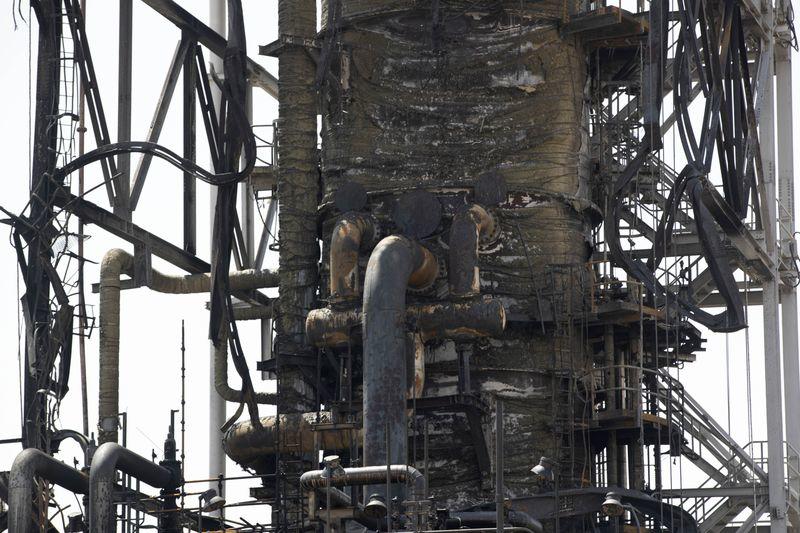
And yet Aramco has remained insistent that the field will return to pre-attack output levels this month, after the company reported losing half its daily output in the aftermath of the early Saturday attacks, impacting a whopping 5% of total global supply.
Per Bloomberg, Khurais has a capacity of 1.45 million barrels a day, processing all oil on site; however the attack took out four 300-foot towers essential to the production process.
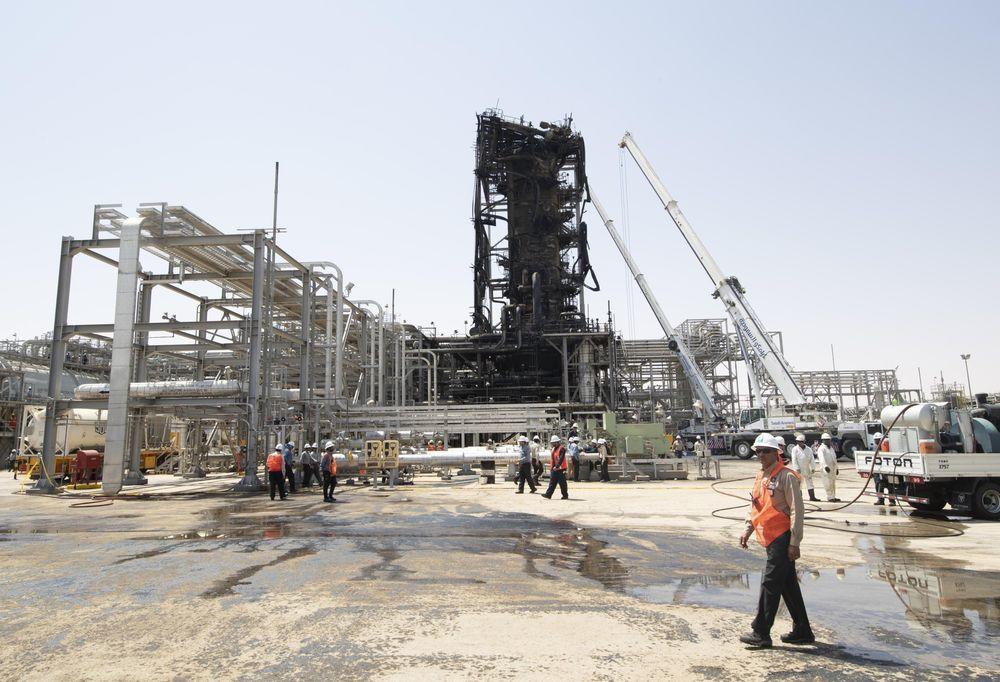
Like at the Abqaiq processing plant nearer the coast, the strikes — whether by drones or ballistic missiles (debris showed by the Saudi Defense Ministry this week featured both) — appeared remarkably precise.
The Saudis have counted a total of twenty-five drones and missiles used in the twin attacks, after statements by Yemen’s Houthi rebels claimed ten drones were used.
…click on the above link to read the rest of the article…
Who Really Benefits From The “Iran Attacked Saudi Arabia” Narrative?
Who Really Benefits From The “Iran Attacked Saudi Arabia” Narrative?

After 9/11 the concept of the “false flag attack” gained prominence in American culture, and ever since, more and more people are starting to question the official narrative whenever new crisis events occur. It is possible that this is why there has not been another attack in the US on the scale of 9/11 since 2001; not because the government is doing a better job with security (there was ample security in operation on 9/11 that for some reason was not utilized), but because it’s harder for government agencies to get away fabricated disasters or scapegoating the wrong people as the culprits.
That said, sometimes governments don’t need to create a false flag from scratch. Sometimes disasters not of the government’s making can be turned into false flags, as long as they can pin the blame on the target they most want to attack.
The elites only need to get away with one major false flag every couple of decades to push the populace into a war or a cultural crisis which can be exploited. This was essentially the strategy outlined by the “Project For A New American Century”, a foreign policy think tank in the 1990’s made up of Neo-Cons and ghouls from the Council On Foreign Relations which called for a “new Pearl Harbor” that would give the US a rationale to enter the Middle East militarily and change the entire political landscape. As Rahm Emanuel once said, “You never want a serious crisis go to waste…”
Of course, they got their Pearl Harbor, but contrary to popular opinion I think it’s wrong to assume that the PNAC was designed to open the door to American hegemony. Rather, I think the intention was to cause the opposite – the eventual fall of American geopolitical influence.
…click on the above link to read the rest of the article…
Blain’s Morning Porridge – September 18th 2019
Blain’s Morning Porridge – September 18th 2019
“There is no equilibrium, we invest into unstable constantly changing markets. ”
Why so Calm?
Even as the Fed meeting pondered raising rates by a smidge, it had to intervene to pump money into the short-term US financial system for the first time since the 2008 crisis. That’s a clear sign of financial dislocation – but markets seem utterly unconcerned. (The wires all quote issues such as tax payments and an imbalance between new funding and low redemptions to explain the sudden lack of cash, but none of my money market chums are convinced. They fear something else, a big No-See-Em is underway.)
The last crisis started in money markets. Add that to the ongoing WTF-happened questions about the Saudi bombings, and there seems to be a curious sense of false calm in markets. No vol, no concern, and gold hardly moving. I can’t help but think of ducks; serenely floating upstream while their legs are furiously paddling below the surface. Something is happening, and we don’t know what it is..
Since I don’t know either, today is the day to take a pop at the Green Puritan movement:
There is a great comment from Bill Gates in the FT – Fossil fuel divestment has “zero” climate impact, says Bill Gates. Worth a read, and maybe get yourself thinking about what damage ESG/Green group-think nonsense is doing? Its distorting the global economy and voiding perfectly sane investment strategies. As regular readers will know, I absolutely believe Climate Change is The Big Threat – but I’m more and more convinced that much of the ESG / Green Investment bandwagon is utter bollchocks!
…click on the above link to read the rest of the article…
Why Would Iran Attack the Saudis NOW?
Why Would Iran Attack the Saudis NOW?
U.S. officials claim that the attacks against Saudi oil facilities were launched from Iranian soil.
Are they right?
We have no idea at this point, as the U.S. government hasn’t released any evidence.
But given that the U.S. and 23 other countries have ADMITTED to carrying out false flag attacks before – including – it’s worth asking whether Iran or another country had more to gain from this attack …
Indeed, U.S. officials have admitted to twice carrying out false flag attacks intended to frame Iran and justify regime change:
(1) The CIA admits that it hired Iranians in the 1950′s to pose as Communists and stage bombings in Iran in order to turn the country against its democratically-elected prime minister.
(2) CIA agents and documents admit that the agency gave Iran plans for building nuclear weapons … so it could frame Iran for trying to build the bomb.
And neocons have been planning on further regime change in Iran for more than 25 years.
So it’s worth questioning this, at least in the absence of real evidence. This is especially true because – until a couple of days ago – it seemed like the U.S. and Iran were moving towards diplomatic talks.
And Trump just fired the head “bomb Iran” cheerleader, John Bolton. So the odds of a peaceful solution to tensions with Iran seemed higher than they had been in years
So why would the Iranians “torpedo” the momentum towards diplomacy, and hand the U.S. a casus belli on a silver platter?
Why now?
Of course, the Houthis have claimed responsibility for the attack, while the Iranians have denied it. But the U.S. isn’t paying any attention to their statements.
It’s possible it really was the Iranians … but given the history of fake “justifications” for war (like Iraq), it’s worth asking questions.
Houthis Say It’s Not Over – Saudi Oil “Still Within Range”; Iraq Denies Its Territory Used
Houthis Say It’s Not Over – Saudi Oil “Still Within Range”; Iraq Denies Its Territory Used
While US officials were quick out of the gate to allege an Iranian attack on Saudi Aramco facilities launched from Iraq early Saturday, a theory which the WSJ said was focus of an ongoing US-Saudi investigation, Iraq’s government issued a firm denial on Sunday, which followed Iran’s own denial that condemned Washington’s “maximum lies”.
Saying there was no link to Iraqi soil and the attack which caused oil prices to spike to record levels the moment markets opened, initially surging to as much as 18% before retreating after President Trump authorized use of the Strategic Petroleum Reserve (SPR) to “keep the markets well-supplied,” the Iraqi government further vowed to “punish anyone who intended to use Iraq as a launchpad for attacks in the region.”
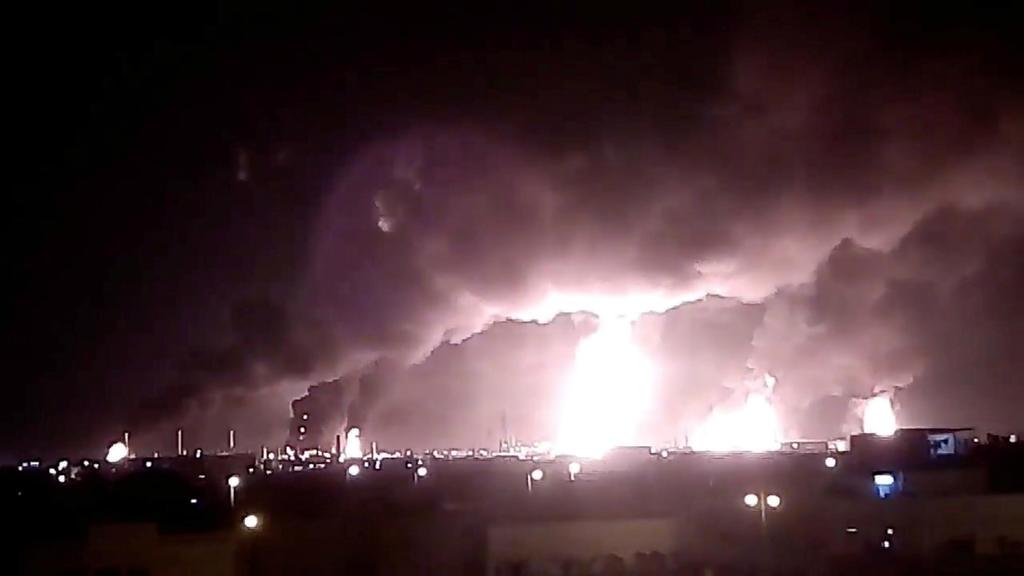
Despite Yemen’s Houthis themselves claiming responsibility for the precision strike using ten drones, unleashing explosions that rocked Abqaiq facility and the Khurais field, US officials have long eyed Iraq’s Shia paramilitary forces also as bad actors which Iran deploys as proxies from Iraqi soil.
Prior reports suggest Iran has indeed stationed ballistic missiles on Iraqi soil within the past year or so, within easy targeting range of key Saudi oil installations, as well as even Tel Aviv.
But crucially the Houthis have defiantly announced it’s not over: “The rebel group said its weapons could reach anywhere in Saudi Arabia. Saturday’s strikes were carried out by aircraft equipped with a new type of engine, the Houthi rebel group said,” Bloomberg reports.

Seems to undermine a primary argument from US gov/media that Houthis dont have the capacity to pull this off, therefore it must have been Iran. https://twitter.com/osamabinjavaid/status/1173243511132393472 …✔Replying to @osamabinjavaid
Iran War Imminent? Trump Says US “Locked And Loaded” To Respond To Saudi Attack
Iran War Imminent? Trump Says US “Locked And Loaded” To Respond To Saudi Attack
Just as the price of oil was settling down from its record surge, it spiked once again, following a tweet by president Trump which has made war with Iran virtually inevitable.
Just before 7pm, Trump tweeted that “Saudi Arabia oil supply was attacked. There is reason to believe that we know the culprit, are locked and loaded depending on verification, but are waiting to hear from the Kingdom as to who they believe was the cause of this attack, and under what terms we would proceed!”

Saudi Arabia oil supply was attacked. There is reason to believe that we know the culprit, are locked and loaded depending on verification, but are waiting to hear from the Kingdom as to who they believe was the cause of this attack, and under what terms we would proceed!
Setting aside the implicit admission that US foreign policy in the middle-east is now inexplicably run by Saudi Arabia, what is far more troubling is Trump’s statement that the US military is “locked and loaded”, and set to attack the country which instigated the attack on Saudi facilities, which according to Mike Pompeo was not Yemen, and its Houthi rebels, but rather Iran.
Now, as Bloomberg’s Javier Blas correctly notes, Trump’s tweet has left Saudi crown prince MbS boxed: “if he doesn’t point to #Iran, he’s likely to dissapointing Trump, but he does, he could start an all-war with Tehran of unknown end.” Needless to say, it is clear which option Saudi Arabia – which has been needling for war with Iran for years – will pick.
…click on the above link to read the rest of the article…
How Much Will Oil Surge When Trading Reopens
How Much Will Oil Surge When Trading Reopens
Now that Goldman has successfully sparked a near-frenzy of chaos, confusion (and market buy orders) ahead of tonight’s trading open, the only question is how high will oil surge. And according to some preliminary estimates, oil analysts expect crude prices to jump at least $5 to $10 a barrel at 6pm on Sunday after some 5% of world oil supply was pulled off the market after a drone strike hit a critical Saudi oil facility.
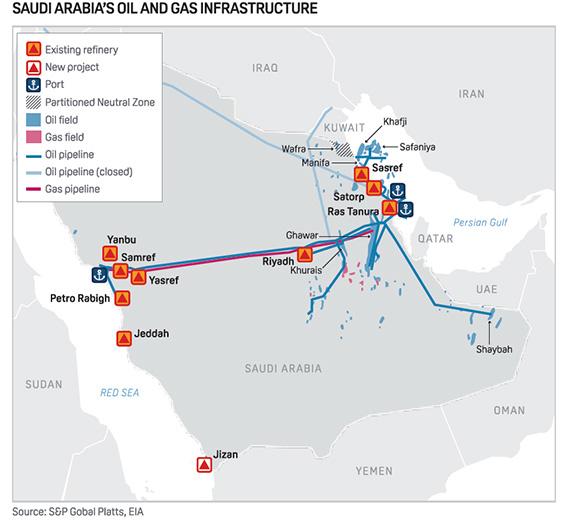
Saudi Aramco lost about 5.7 million barrels per day of output after several unmanned aerial vehicles on Saturday struck the world’s biggest crude-processing facility in Abqaiq and the kingdom’s second-biggest oil field in Khurais. And with Saudi Arabia admitting that it could take weeks to restore full production, Bloomberg reports that the Trump administration is ready to deploy the nation’s emergency oil reserves and help stabilize markets if needed.

While oil slumped 3% last week, dropping amid expectations of an Iran detente following John Bolton’s departure, expect a violent reversal when trading reopens tonight.
“This is a historically large disruption on critical oil infrastructure and these events represent a sharp escalation in threats to global supply with risks of further attacks”, wrote Goldman chief commodity strategist Damien Courvalin. “These events are therefore set to support oil prices at their open on Sunday, especially given recent growth concerns and low levels of positioning. The magnitude of such a price rally is difficult to estimate in the absence of official comments on the timeline and scale of production losses.”
Still, one can try to make some educated estimates of what happens next, with consensus gravitating to a $5-10 spike in kneejerk response.
…click on the above link to read the rest of the article…
Goldman Goes “Lehman Weekend” On Oil: Expects Chaos When Trading Reopens
Goldman Goes “Lehman Weekend” On Oil: Expects Chaos When Trading Reopens
Exactly 11 years to the day since traders organized an emergency impromptu CDS unwind session ahead of Lehman’s shocking September 15, 2008 bankruptcy filing, major banks are preparing for similar chaos, only this time in the crude oil market in the aftermath of Saturday’s shocking drone attack on the most important oil processing plant in Saudi Arabia (and the world) which may result in a production shortfall of millions of bpd that stretches for days if not weeks, and lead to an explosion in oil prices (for those who are reading this early on Sunday afternoon, gas up your car now before gasoline prices surge on Monday).
First, we present the email that was just sent out by Saxo’s Christopher Dembik, indicating that when Brent reopens, it will surge as much as $5-10 in the Asian session:
Very short comment on what is happening in the oil market.
Following the events in Saudi Arabia, well-informed market participants expect that oil prices may increase by $5-10 per barrel in the Asian session.
Higher pressure on CNY, but also negative for TRY and INR due to elevated current account deficits.
Too early to assess the exact macro impact by it is bright clear we don’t need an oil shock…
The bottom line: oil may spike much more if the return to normal production takes longer than expected. Sure enough, that is the main point conveyed in an email that was just blasted out by Goldman sales (not research) to the bank’s top clients around the globe, with a message is simple: expect chaos when oil reopens… and sharply higher prices.
…click on the above link to read the rest of the article…
We’re Ready For “Full-Fledged” War: Iran Responds To US Accusation It Launched Saudi Oil Attack
We’re Ready For “Full-Fledged” War: Iran Responds To US Accusation It Launched Saudi Oil Attack
After the United States was quick to point the finger at Iran for the early Saturday explosions that rocked Abqaiq facility and the Khurais field — forcing production to be shut and with it 5.7 million barrels a day of oil production lost — Iran has warned it stands ready for a “full-fledged” war.
Iranian foreign ministry spokesman Abbas Mousavi slammed Washington for a “maximum pressure” strategy that has turned to “maximum lies,” saying that because of the former’s “failure [the US] is leaning toward maximum lies”. FM Javad Zarif also said these were a continuation of efforts to pressure and shame into compliance under US hegemony.
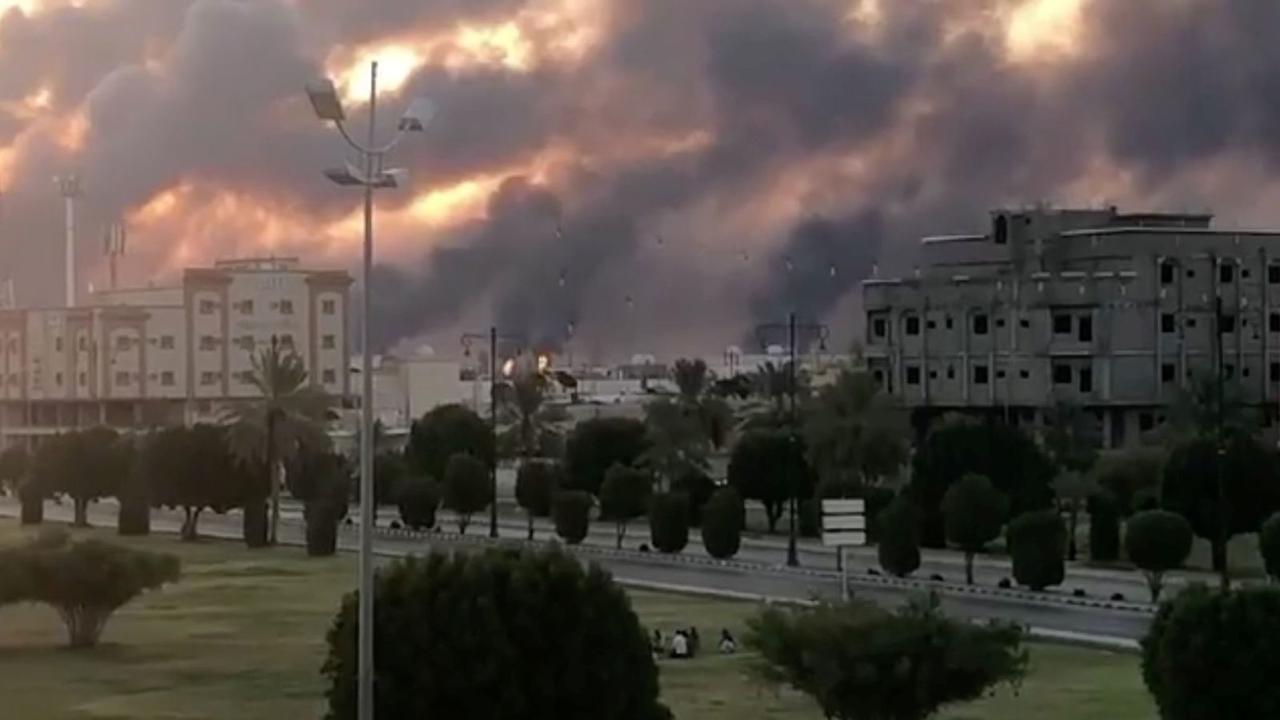
Iran denied the accusations, which followed photos circulating online which appeared to show cruise missile debris scattered in the Saudi desert outside the incapacitated oil facilities. Yemen’s Houthi forces had claimed responsibility, saying it deployed ten drones in the successful targeting of the facilities.
And separately an IRGC commander is reported to have reaffirmed that American military bases and aircraft carriers are crucially up to 2,000km around Iran and thus “within range” of Iranian missiles.
The senior commander, Amirali Hajizadeh, said his country stands ready for a “full-fledged” war but he stopped short of directly mentioning the attacks. As quoted in regional and state media:
On Sunday, the commander of Iran’s Revolutionary Guards Aerospace Force, Amir Ali Hajizadeh, was quoted by the semi-official Tasnim news agency as saying: “Everybody should know that all American bases and their aircraft carriers in a distance of up to 2,000 kilometers around Iran are within the range of our missiles,” according to Reuters.
“Iran has always been ready for a ‘full-fledged’ war,” Hajizadeh added, without directly mentioning the attacks in Saudi Arabia.
…click on the above link to read the rest of the article…



